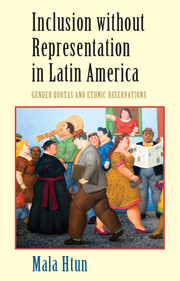Book contents
- Frontmatter
- Dedication
- Contents
- List of Tables and Figures
- Preface and Acknowledgments
- List of Acronyms
- 1 Introduction: Politics of Inclusion in Latin America
- 2 Women, Afrodescendants, and Indigenous Peoples in Elected Office
- 3 Gender Quotas: Why and How?
- 4 Indigenous Reservations and Gender Parity in Bolivia (written with Juan Pablo Ossa)
- 5 Political Inclusion in Colombia
- 6 Brazil: Combatting Exclusion through Quotas in Higher Education
- 7 After Quotas: Women's Presence and Legislative Behavior in Argentina (written with Marina Lacalle and Juan Pablo Micozzi)
- 8 Conclusion
- Appendix 1 Research Trips
- Appendix 2 Mechanisms of Inclusion
- References
- Index
7 - After Quotas: Women's Presence and Legislative Behavior in Argentina (written with Marina Lacalle and Juan Pablo Micozzi)
Published online by Cambridge University Press: 18 December 2015
- Frontmatter
- Dedication
- Contents
- List of Tables and Figures
- Preface and Acknowledgments
- List of Acronyms
- 1 Introduction: Politics of Inclusion in Latin America
- 2 Women, Afrodescendants, and Indigenous Peoples in Elected Office
- 3 Gender Quotas: Why and How?
- 4 Indigenous Reservations and Gender Parity in Bolivia (written with Juan Pablo Ossa)
- 5 Political Inclusion in Colombia
- 6 Brazil: Combatting Exclusion through Quotas in Higher Education
- 7 After Quotas: Women's Presence and Legislative Behavior in Argentina (written with Marina Lacalle and Juan Pablo Micozzi)
- 8 Conclusion
- Appendix 1 Research Trips
- Appendix 2 Mechanisms of Inclusion
- References
- Index
Summary
What happened after quota laws were adopted? Did women's presence in power improve? Were there changes to legislative behavior and advocacy of women's rights issues? Activists and scholars often justified gender quotas by referring not just to political inclusion but also to political representation. Greater numbers of women elected officials – so the argument goes – leads to more deliberation over gender equality and raises the chances that legal and policy changes expanding rights will be adopted. As Mansbridge puts it: “[The] descriptive representation by gender improves substantive outcomes for women in every polity for which we have a measure” (2005, p. 622). This “story of the critical mass theory” has helped women activists around the world convince policy makers to fix targets, usually 30 percent or higher, for women's presence in politics (Dahlerup, 2006b, pp. 514–517).
Yet analysis of existing research demonstrates that women's political presence is “neither absolutely necessary nor entirely sufficient” for legislative action on women's rights (Beckwith & Cowell-Meyers, 2007; Celis & Childs, 2008; Celis et al., 2008; Childs & Krook, 2006; Reingold, 2008, p. 128). Some women advocate gender equality more forcefully than others; some men are more supportive than some women; and different institutional contexts foster differing amounts of feminist activity (Reingold, 2008). What's more, studies differ in how they conceptualize and measure representative behavior to advance women's rights (which many scholars call “women's substantive representation”). Whereas some conceive it as a process of articulating, advocating, and discussing concerns expressed by many women, others view it as an outcome that is reflected in changes of laws and policies (Franceschet & Piscopo, 2008). These differences signal a lack of consensus among both scholars and advocates about what it means for women to “make a difference” in political life (Dahlerup, 2006b, p. 517).
Scholars who analyze the process of representation tend to focus on activities such as bill initiation, legislator priorities, committee behavior, speeches, and the like. These studies tend to show that women are more likely than men to sponsor feminist legislation, prioritize gender equality issues, and seek to convince other legislators to support gender equality initiatives (see, e.g., Reingold, 2000; Schwindt-Bayer, 2006, 2010; Swers, 2002; Thomas, 1994). However, there is less evidence that women's presence results in positive outcomes on women's rights (Childs & Krook, 2006, pp. 523–534; Reingold, 2008, pp. 131–132; Wang, 2013).
- Type
- Chapter
- Information
- Inclusion without Representation in Latin AmericaGender Quotas and Ethnic Reservations, pp. 138 - 160Publisher: Cambridge University PressPrint publication year: 2016



